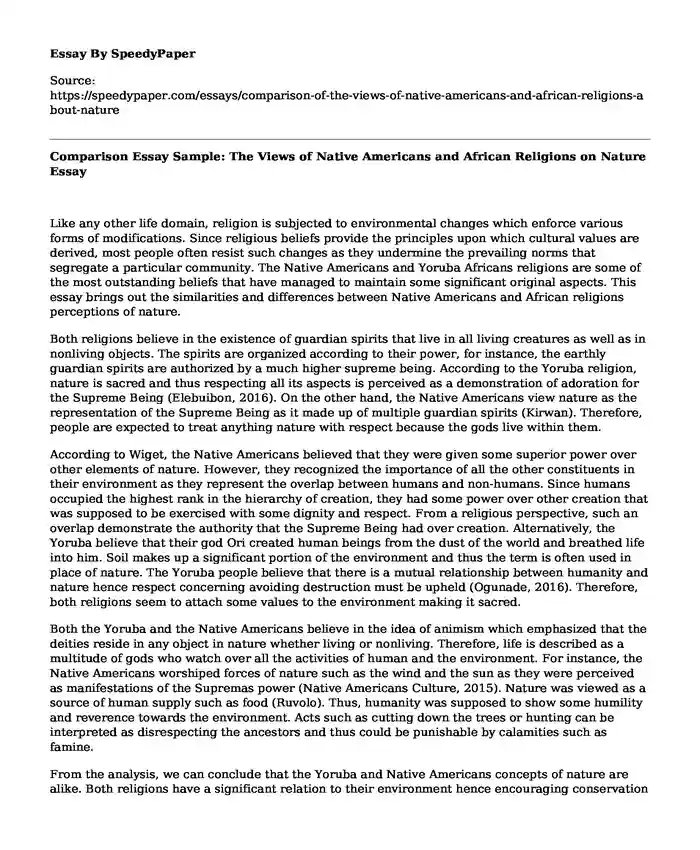Like any other life domain, religion is subjected to environmental changes which enforce various forms of modifications. Since religious beliefs provide the principles upon which cultural values are derived, most people often resist such changes as they undermine the prevailing norms that segregate a particular community. The Native Americans and Yoruba Africans religions are some of the most outstanding beliefs that have managed to maintain some significant original aspects. This essay brings out the similarities and differences between Native Americans and African religions perceptions of nature.
Both religions believe in the existence of guardian spirits that live in all living creatures as well as in nonliving objects. The spirits are organized according to their power, for instance, the earthly guardian spirits are authorized by a much higher supreme being. According to the Yoruba religion, nature is sacred and thus respecting all its aspects is perceived as a demonstration of adoration for the Supreme Being (Elebuibon, 2016). On the other hand, the Native Americans view nature as the representation of the Supreme Being as it made up of multiple guardian spirits (Kirwan). Therefore, people are expected to treat anything nature with respect because the gods live within them.
According to Wiget, the Native Americans believed that they were given some superior power over other elements of nature. However, they recognized the importance of all the other constituents in their environment as they represent the overlap between humans and non-humans. Since humans occupied the highest rank in the hierarchy of creation, they had some power over other creation that was supposed to be exercised with some dignity and respect. From a religious perspective, such an overlap demonstrate the authority that the Supreme Being had over creation. Alternatively, the Yoruba believe that their god Ori created human beings from the dust of the world and breathed life into him. Soil makes up a significant portion of the environment and thus the term is often used in place of nature. The Yoruba people believe that there is a mutual relationship between humanity and nature hence respect concerning avoiding destruction must be upheld (Ogunade, 2016). Therefore, both religions seem to attach some values to the environment making it sacred.
Both the Yoruba and the Native Americans believe in the idea of animism which emphasized that the deities reside in any object in nature whether living or nonliving. Therefore, life is described as a multitude of gods who watch over all the activities of human and the environment. For instance, the Native Americans worshiped forces of nature such as the wind and the sun as they were perceived as manifestations of the Supremas power (Native Americans Culture, 2015). Nature was viewed as a source of human supply such as food (Ruvolo). Thus, humanity was supposed to show some humility and reverence towards the environment. Acts such as cutting down the trees or hunting can be interpreted as disrespecting the ancestors and thus could be punishable by calamities such as famine.
From the analysis, we can conclude that the Yoruba and Native Americans concepts of nature are alike. Both religions have a significant relation to their environment hence encouraging conservation of the environment. However, slight contrasts in the two religions are likely to exist due to the differences in the geographical locations of the two religions.
References
Elebuibon, A. F. (2016, May 21). Yoruba Spirituality & Earth Consciousness. If Festival. Retrieved from http://www.obafemio.com/yoruba-spirituality--earth-consciousness.html
Kirwan, P. (n.d.). The Emergent Land: Nature and Ecology in Native American Expressive Forms. 71. Retrieved from http://www.ucd.ie/pages/99/articles/kirwan.pdf
Native Americans Culture. (2015, March). Native Americans Culture. Native American Culture. Retrieved from http://www.warpaths2peacepipes.com/native-american-culture/
Ogunade, R. O. (2016). The Yoruba of ORI about Human Destiny. Retrieved from http://unilorin.edu.ng/publications/raymond/The%20Yoruba%20Concept%20of%20Ori%20in%20relation%20to%20Human%20Destiny.htm
Ruvolo, D. (n.d.). A summary of Native American Religions. A Summary of Native American Religions. Retrieved from http://are.as.wvu.edu/ruvolo.htm
Cite this page
Comparison Essay Sample: The Views of Native Americans and African Religions on Nature. (2019, Aug 28). Retrieved from https://speedypaper.net/essays/comparison-of-the-views-of-native-americans-and-african-religions-about-nature
Request Removal
If you are the original author of this essay and no longer wish to have it published on the SpeedyPaper website, please click below to request its removal:
- Free Essay Example: Environmental Responsibility Survey
- Free Essay Sample: Congregational Life in the Year 2014
- Essay Sample: Frederick Douglass on What It Means to be Fully Human
- Free Essay: Experiences with Race and Assimilation
- Essay Example on Workplace Violence and Harassment Program
- Interview with an Elderly Person - Paper Example
- Critical Essay on Quentin Tarantino's Kill Bill
Popular categories





